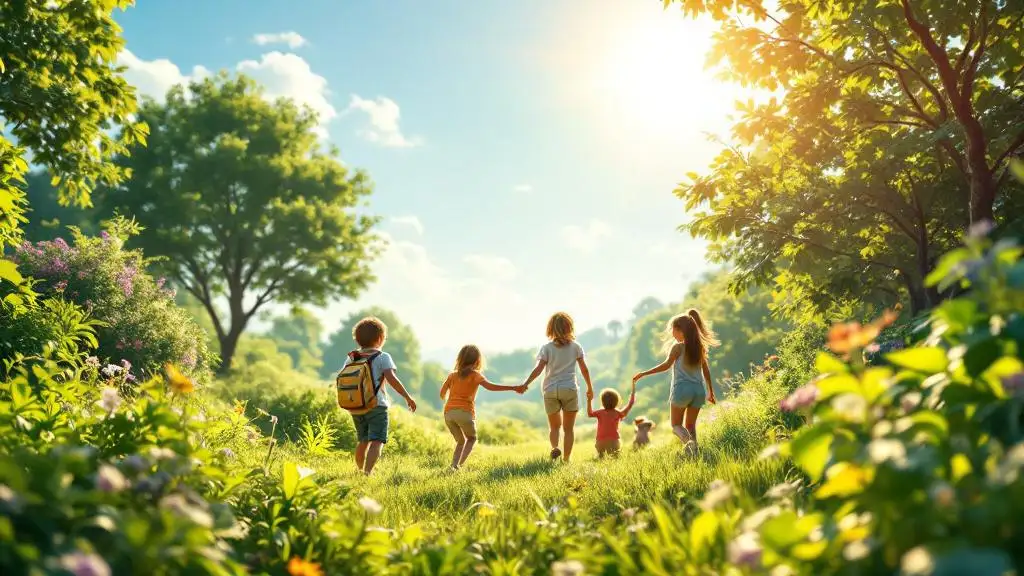Using Nature Activities To Encourage Exploration

The Power of Outdoor Exploration in Childhood Development
Nature activities are indispensable tools for nurturing exploration, curiosity, and learning among children. By immersing young explorers in natural environments, caregivers and educators can foster vital physical, cognitive, and emotional skills that contribute to holistic development. This article delves into effective ways to leverage nature-based activities to inspire children, offering practical strategies, educational insights, and the profound benefits of outdoor play.
Enhancing Engagement and Communication through Sensory Exploration in Nature Walks
How does sensory exploration through nature walks enhance children's engagement and communication?
Sensory exploration during nature walks immerses children in a variety of rich, multisensory experiences that stimulate their natural curiosity. By engaging multiple senses—sight, touch, smell, hearing, and even taste (when appropriate and safe)—children become more attentive and aware of their environment. This heightened sensory awareness encourages them to observe details like the texture of leaves, the scent of flowers, the sounds of birds, or the feel of cool water.
These activities support their cognitive development by enhancing their ability to notice patterns, compare objects, and make connections. Motor skills also improve as children reach, grasp, and explore natural materials, strengthening coordination and tactile sensitivity. Emotionally, sensory activities can calm children and foster feelings of wonder, joy, and comfort.
Importantly, sensory exploration promotes communication. As children describe their observations, label objects, or share their experiences, they practice expressive language and build vocabulary. Guided questions from adults can spark conversations, encouraging children to articulate their thoughts and feelings.
Natural settings provide an ideal backdrop for such interactions, offering limitless opportunities for children to explore freely and express themselves. Overall, sensory-rich outdoor walks create meaningful opportunities for children to engage deeply with their surroundings while developing vital communication skills.
Fostering Holistic Development through Outdoor Activities and Nature Exploration

How can outdoor activities and nature exploration promote childhood development?
Engaging children in outdoor activities and exploring natural environments contribute immensely to their overall growth. Physically, outdoor play helps build strength, balance, and coordination as kids climb trees, run, jump, and interact with natural objects like rocks and logs.
Additionally, spending time outside promotes mental health by reducing stress and anxiety. It allows children to relax, feel calm, and develop resilience when facing challenges. The exposure to sunlight also supports the production of vitamin D, which is vital for healthy bones and immune function.
Cognitive development flourishes through activities that ignite curiosity and problem-solving. Nature exploration encourages children to observe, ask questions, and experiment, fostering creativity and critical thinking skills.
Socially, outdoor play nurtures cooperation, empathy, and responsibility. Children learn to share tools, work together on scavenger hunts, or care for plants and insects, building their social skills and sense of community.
Overall, these outdoor experiences provide essential opportunities for children to develop physically, emotionally, intellectually, and socially in a natural setting, laying a strong foundation for lifelong health and happiness.
Innovative Ideas to Encourage Exploration and Curiosity in the Outdoors

What are some effective ways to encourage exploration through outdoor play and nature activities?
Promoting exploration and curiosity in children can be achieved through a variety of engaging outdoor activities. Organizing scavenger hunts is a popular way to motivate children to look closely at their environment, searching for specific natural items like leaves, rocks, or insects. Nature walks further stimulate the senses as children observe sights, sounds, and smells, fostering mindful awareness.
Incorporating hands-on projects allows children to interact directly with nature. Activities such as planting seeds, maintaining small gardens, or creating mud kitchens enable sensory exploration and teach responsibility. Bug hunts with magnifying glasses or bug catchers encourage scientific inquiry and fascination with insects.
Creative outdoor play also supports imagination. Building forts, fairy gardens, or making natural art from leaves, bark, and stones sparks creativity and storytelling skills. These activities not only entertain but also boost problem-solving and social interaction.
Encouraging children to learn about local plants, animals, and ecosystems enhances their understanding and appreciation of nature. Providing opportunities for outdoor chores like watering plants or collecting natural materials fosters responsibility and environmental stewardship.
In summary, combining structured activities like scavenger hunts and nature walks with unstructured, creative play facilitates a well-rounded approach to exploring the outdoors. Such experiences promote physical health, cognitive growth, and a lifelong connection to the natural world.
Integrating Nature into Education to Inspire Learning and Wonder

How can nature activities be integrated into childhood education to inspire curiosity and learning?
Bringing nature into early childhood education helps spark curiosity and enhances overall learning experiences. This integration can include outdoor routines such as nature walks, garden play, and outdoor meals that deepen children's connection to their environment.
Hands-on activities using natural materials like leaves, rocks, and sticks encourage sensory exploration and creativity. For example, children can create art from natural items, build fairy houses, or engage in nature-based crafts that promote fine motor skills and imagination.
Designing outdoor environments with accessible gardens, natural play structures, and wildlife observation spots fosters exploration and physical development. Activities like bug hunts, birdwatching, and collecting natural objects motivate children to observe, question, and learn about ecosystems.
In the classroom, incorporating natural images, earth-tone decor, and plant-filled spaces creates calming, engaging settings that support emotional well-being. Pairing indoor activities with outdoor adventures, such as science experiments in natural settings or story time amid trees, encourages curiosity and hands-on learning.
Connecting curriculum themes—like animals, plants, weather, and conservation—with outdoor activities cements understanding through real-world experience. Overall, blending outdoor routines, natural materials, and thoughtful environment design offers children a holistic approach to discovering and appreciating the natural world, paving the way for lifelong curiosity and learning.
Fostering a Lifelong Love of Nature and Learning
Incorporating outdoor activities and nature exploration into childhood development strategies nurtures curiosity, physical health, and emotional resilience. By providing children with varied opportunities for sensory engagement, creative expression, and environmental stewardship, educators and parents can cultivate a generation of explorers who value and understand the natural world. These practices not only support immediate developmental benefits but also lay the foundation for responsible, environmentally-conscious citizens committed to preserving our planet for future generations. Embracing the outdoors as an extension of the classroom ensures that exploration and discovery become lifelong pursuits, enriching children's lives today and beyond.
References
- 30+ Nature Play Ideas for the Early Years - Treehouse Schoolhouse
- Outdoor Exploration Activities | Action for Healthy Kids
- Outdoor Play and Nature Exploration: Connecting Kids with the ...
- Encouraging Outdoor Exploration: Nature-Based Learning Activities
- 43+ Outside Activities For Fun On The Go Exploration
- 11 Activities That Engage Young Children with Nature - Brookes Blog
- 20 Educational Outdoor Activities for Preschoolers [Updated for 2025]
- Getting kids outside: one of the best things a parent can do
- Trees & Me: Activities for Exploring Nature with Young Children
- Explore the Great Outdoors with Your Child - NAEYC